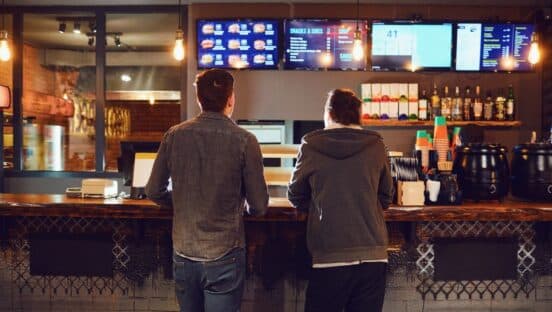





Finance figures
There’s no question that 2018 was a momentous year in the world of restaurant finances. Billions were spent on mergers and acquisitions. Consumers kept putting downward pressure on menu prices. And industry giants Chipotle and Papa John’s both struggled to overcome major setbacks. Those things all occurred against a backdrop of a digital disruption.
Here’s a look at some of the biggest finance stories of the year.
M&A activity is still going strong
Financial markets showed continued interest in restaurant mergers and acquisitions.
Newly formed Inspire Brands announced in late September it had acquired Sonic Corp. for $2.3 billion. Roark Capital Group owns a majority stake in Inspire Brands, which was created in February 2018 after Arby’s Restaurant Group purchased Buffalo Wild Wings for $2.9 billion.
Sonic CEO Cliff Hudson touted the sale’s value to shareholders, as well as the “important benefits” of moving to private ownership for customers, franchisees, and employees. The Sonic deal wasn’t the only big merger of 2018; just weeks before, Cava bought Zoës Kitchen for about $300 million.
Several years ago, private equity groups were wary of the restaurant space, says Gary Stibel, founder and CEO of the New England Consulting Group. They’ve since learned that with the right concept, restaurant chains can scale quickly.
Value heightens even as the economy improves
This year proved there’s little relationship between the state of the overall economy and consumers’ demand for value. Even as unemployment levels dipped and stock prices reached record highs, major quick-service chains continued to double-down on value menus and ultra-cheap promotions.
That continued to create profitability challenges for brands that must simultaneously compete against the ever-growing lineup of grocery stores and C-stores offering prepared foods. Smart restaurants have built value-minded specials around lower-cost ingredients like chicken over higher-priced items like pork, Stibel says.
“Value is here to stay, and it’s getting more difficult to create,” he says. “Yesterday’s value is not good enough, because everybody copies yesterday’s value.”
Papa John’s meltdown shows risk of identity-driven brands
Papa John’s has floundered since founder and shareholder John Schnatter criticized the NFL’s handling of national anthem protests last year. The maligned owner stepped down as CEO over the summer, but sales continue to suffer and the chain has warned that it may close a number of stores as it works to repair its image.
Prior to the controversy, Papa John’s was often held up as a quick-service model for its integration of technology and strong mobile presence, says Jason Moser, an analyst at Motley Fool.
“They had some self-inflicted wounds on John Schnatter’s part that really tarnished the brand,” Moser says. “It’s going to be difficult for them to come back from that.”
For years, Schnatter embodied the Papa John’s brand; his photo even appeared on the pizza boxes. Moser says other operators should think carefully before tethering their companies so closely to a single executive or spokesperson. The days of big, public personalities like KFC founder Colonel Harland Sanders and Wendy’s creator Dave Thomas may be over.
“Concepts going forward are gearing more toward investing in the brand as opposed to a particular icon tied to the brand,” Moser says. “It’s just a little bit of a different world today, and obviously information travels at the speed of light.”
Chipotle woes highlight fast-casual struggles
Chipotle continued to shake off its food-safety stigma. Investors cheered when Taco Bell CEO Brian Niccol was tapped in February to take the helm.
“All in all, we think Niccol is a plus,” says R.J. Hottovy, restaurant analyst at investment research firm Morningstar. “That said, just boots on the ground, you don’t see as many people in line as you used to see.”
In some ways, Chipotle’s fall from its previous wunderkind status speaks to transformations happening across the fast-casual space. That market has become increasingly saturated, Hottovy says.
“You’re seeing quick service certainly taking more of that fast-casual share than they were able to do before,” he says. “The line between fast casual and quick service is a little bit blurrier than it used to be.
Digital disruption ushers in more private equity
A multitude of third-party apps has helped restaurant companies roll out delivery platforms. This past year showed that the days of delivery being relegated to pizza and subs are over. It’s clearly mainstream now.
But the digital disruption has touched every part of the restaurant business, including consumer-facing delivery platforms and back-of-house inventory and labor-management systems, Hottovy says.
“We’ve seen a restaurant tech boom,” he says. “And we’re not just talking about the delivery companies.”
Still, not all operators are well positioned to compete in this rapidly changing environment. As Hottovy points out, an increasingly tech-forward landscape has pushed some restaurants outside their core competencies. That, in turn, has created an opening for private equity firms. “The changes that restaurants need to make aren’t going to happen overnight. And honestly, there’s going to be a lot of investment required,” Hottovy says. “It makes a lot of sense for these operators to be private as they make these changes.”










